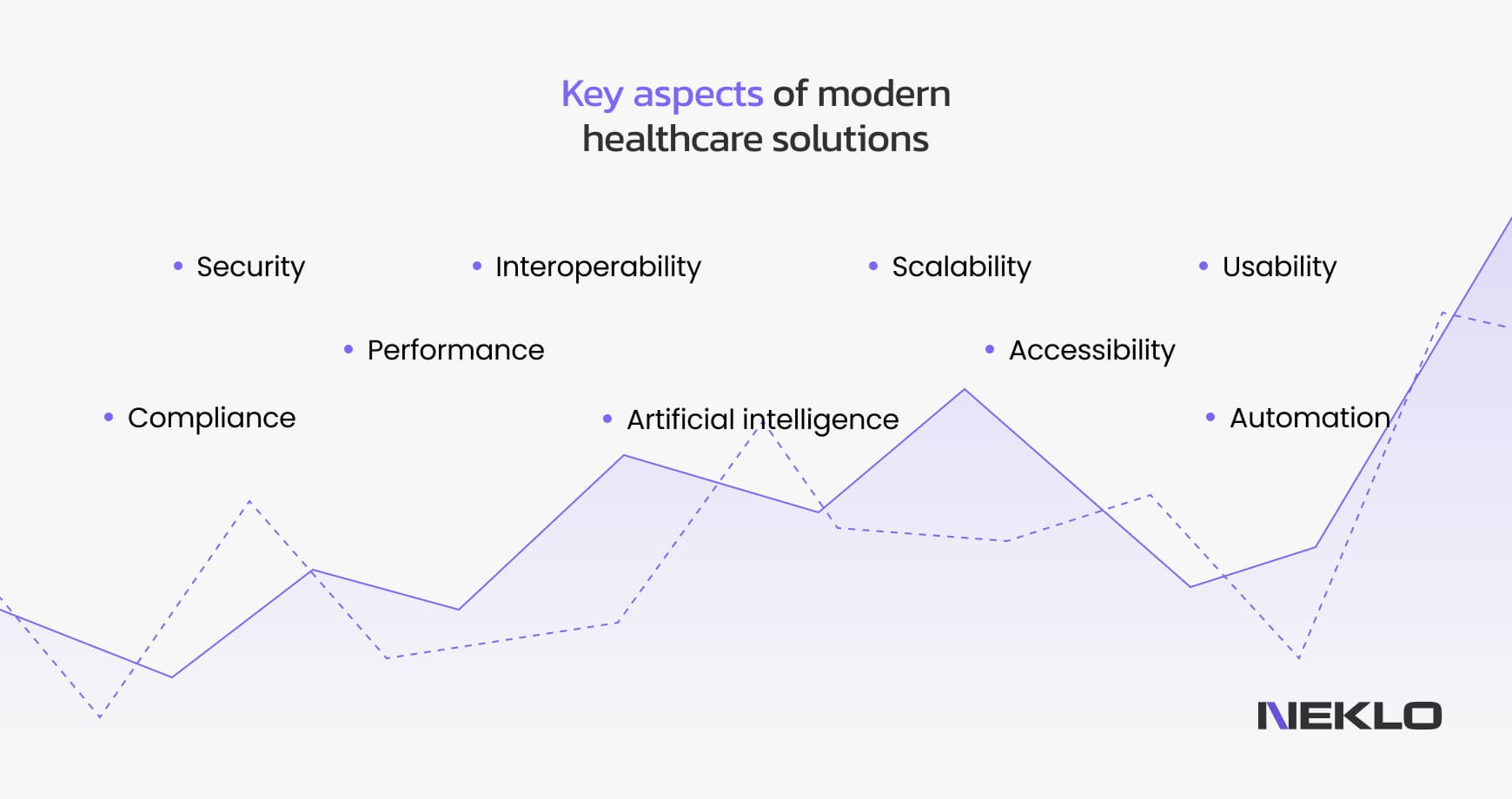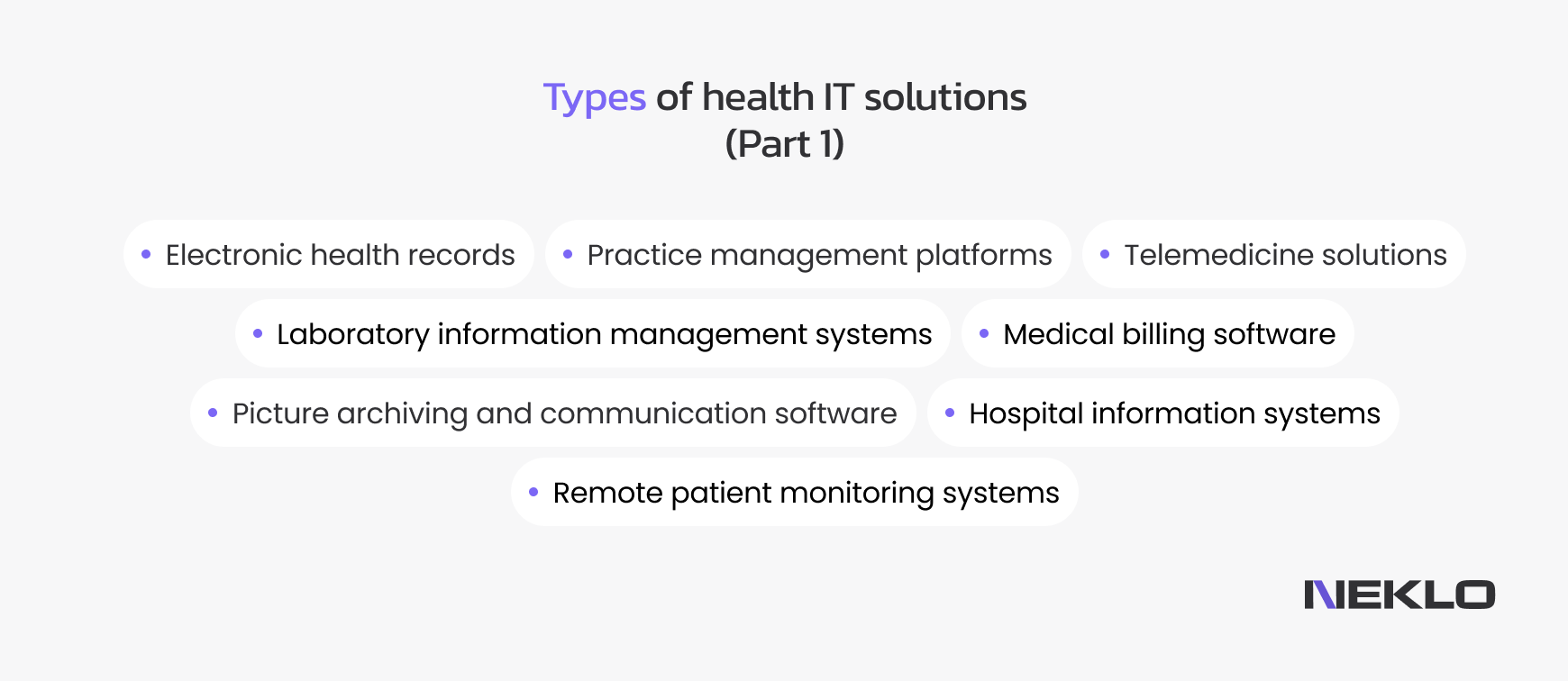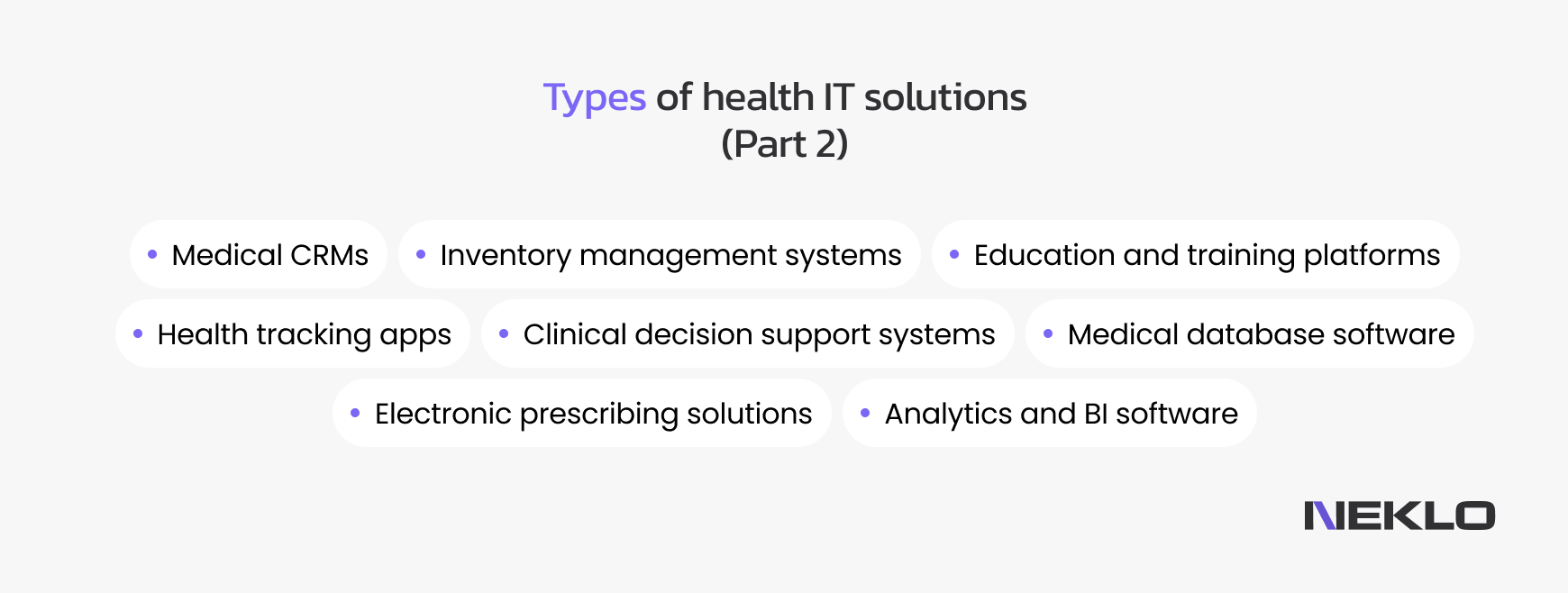At the dawn of global digitalization, it was obvious that software would transform many business areas. Healthcare was not an exception. Now, the number of available IT solutions is enormous, ranging from specialized ERPs, CRMs, and EHRs to more specific lab platforms, inventory management systems, and medical imaging systems.
If you’re hitting a wall with your current software that is outdated, slow, vulnerable to cyberattacks, or just lacking features, it’s time to choose something new. Today, we’ll overview the most popular software types for medical practices, clinics, and hospitals that help to improve care outcomes, personalize treatment, streamline workflows, and make the work of medical staff and administrators easier — just what the doctor ordered!
Key takeaways
- The healthcare solutions market offers a vast array of options for clinics and practices of different specialties, sizes, and business needs. The most popular software includes EHR systems, hospital management software, and telemedicine apps.
- The key aspects of IT products in healthcare include security and compliance, scalability, integrations, usability, and features powered by modern technology such as artificial intelligence, machine learning, and robotic process automation.
- The benefits of medical software solutions include enhanced patient care, streamlined billing and claim processing, routine task automation, more opportunities for collaborative care, and robust analytics capabilities.
- Cookie-cutter solutions leave you frustrated? NEKLO has 20+ years of experience in healthcare software development and can help you build a platform tailored to your workflows and business needs.
Key aspects of healthcare information technology solutions
While health software solutions are diverse, serving different purposes and medical practices, they all have characteristics implied by the industry. These features include:
Adherence to security and compliance: all healthcare-related software must comply with different regulations like HIPAA, GDPR, and PIPEDA in order to safeguard personal health information from cyber threats and illegal disclosure.
Interoperability: healthcare apps cannot operate in isolation — seamless data flow between systems has become a must. Clinical information sharing improves care delivery standards and leads to more coordinated, continued care.
Scalability and performance: in a fast-changing world, the ability to handle a sudden patient influx fast is necessary for any business. Maintaining speed and reliability for systems like EHR results in timely care delivery, better operations, and happier patients.

Usability and accessibility: medical software users can be of any age and ability. It is important to build easy-to-use software that is equally easy to navigate for any age group, keeping their special needs in mind.
Use of AI and automation: clinics and hospitals must manage hundreds of thousands of patient records, including structured and unstructured data. New technology helps to replace manual tasks, enhance analytics, and improve diagnosis.
Best healthcare software solutions for medical organizations
Here, we gathered the most widespread software products for healthcare organizations. From patient records management to medical imaging processing — look through the solutions and find suitable ones for your practice!

EHR
Electronic health records keep diverse patient information in one place: prescriptions, diagnoses, clinical notes, lab results, MRI, and CT scans are securely collected and stored. In contrast to electronic medical records, EHRs imply easy information sharing between healthcare providers, contributing to care continuity wherever the patient requires medical services.
Today, EHRs are the most widespread type of software in US-based healthcare. Around 88.2% of physicians working in the office settings have adopted the EMR/EHR system for their practices, and it’s not surprising. Properly organized medical electronic records can provide data fast during emergency situations, identify prescribed medication conflicts, and facilitate the submission of medical claims, improving treatment outcomes and reducing paperwork.
Practice management software
Running a private practice 'isn't an easy feat without proper medical software solutions. Practice management platforms help to keep everything in place: patient demographics, scheduling, billing, claims processing, and reporting.
In 2024, North America dominated the practice management system market with a revenue share of 46.24%. So, there are lots of options on the market, and you can find a fitting solution for your clinic size, goals, and needs, whether you're a solo practitioner or a large healthcare organization.
Telemedicine solutions
The urge for remote consultations remains sharp. People with limited mobility or ones from remote areas reap benefits of using telemedicine apps, like not commuting to the clinic for hours, easy doctor appointment scheduling, secure and multichannel communication, and faster service delivery. All these factors contribute to better patient outcomes and continued care.
The telehealth and telemedicine market continues to expand due to telecommunication advancements, government support, and regulation adjustments. Convenience and cost-efficiency are additional factors that increase the popularity of online appointments. Patients can get virtual consultations for minor problems, proceed with routine check-ups, and book follow-up appointments.
Laboratory information management systems
Healthcare software solutions help manage laboratory operations and provide accurate, timely information for better patient care. Laboratory information management systems (LIMS) facilitate sample tracking, data management, and quality control and introduce automated workflows. They help produce reliable test results and make your business flexible to adapt to frequent technology changes.
The major benefits of special lab software include compliance support, reagents and lots tracking, instrument run monitoring, and seamless integration with other in-lab systems. You can enhance collaboration by sharing findings and comparing results, no matter whether you run a research laboratory, pharmaceutical lab, or are a laboratory service provider.
Hospital information systems
Technological advancements assist clinical care teams and administrators with daily tasks. Such systems facilitate tracking certifications and licenses in the organization, managing working hours and scheduled appointments, collecting patient feedback, and monitoring bed availability and patient placement.
In 2025, the hospital information systems (HIS) market was valued at $63.80 billion and is expected to grow at a CAGR of 10.6% by 2030. The future trends include increasing use of cloud-based HIS, improved interoperability, and the vast introduction of big data analytics.
Remote patient monitoring systems
Remote patient monitoring revolutionized the way people handle their health conditions, keeping doctors informed without actual visits to the clinic. Collection of patient data outside of healthcare organizations is done by health-tracking apps, sensors, devices, and monitors that can measure heart rate, blood pressure, pulse oximeters, glucose monitors, and other vitals.
Such systems allow patients to update their medical information, alert clinics of abnormalities, and monitor chronic disease or recovery from home, saving doctors time.
Medical billing software
Medical billing and revenue cycle management systems make financial operations automated and faster. Processes like invoicing, claims management, and reimbursements become easier and require less human interference. The benefits include reduced billing errors, faster payment cycles, enhanced claims processing, and improved financial performance.
You can easily integrate such health IT solutions with almost any ERP, CRM, or EHR system, knowing that all data remains secure and professionals get a comprehensive picture of your revenue cycle. Kareo Billing, athenahealth, CollaborateMD are the most popular medical billing software examples.
Picture archiving and communication systems
Unstructured patient information such as X-ray results, MRI scans, and CT scans need proper handling and analysis. Picture archiving and communication systems (PACS) help to store, retrieve, manage, and distribute medical images. PACS improves diagnostics accuracy and speeds up patient treatment, promoting teamwork between departments and doctors. The records can be stored on-premise or in the cloud and simultaneously accessed via workstations, specialized platforms, and mobile devices.

Medical CRMs
Customer relationship management systems cultivate strong bonds with customers. Healthcare CRM tracks referrals, keeps patients’ data together, sends appointment reminders, and personalizes interactions with patients.
CRMs not only increase user satisfaction but also foster long-term trust while offering unique experiences for patients. They help gain insights and discover trends that empower businesses and drive customer marketing efforts.
Inventory management systems
Large hospitals typically own thousands of items and medical devices that all need to be counted, timely maintained and reordered. Inventory management systems are designed to track essential supplies, including gloves, masks, thermometers, tapes, wheelchairs, and antiseptic wipes, and to evaluate their availability, ensuring timely restocking.
As a result, the medical staff receives supplies when they are needed most, while hospital management maintains the right stock balance and avoids both shortages and overstocking. This enhances care, saves money, and helps operations.
Clinical decision support systems
Technology pillars healthcare organizations in many ways, including clinical decision improvement. Designated apps help clinicians make well-informed decisions based on evidence. They supply professionals with information, integrate patient data and medical expertise, and conduct patient history analysis to improve diagnosis and risk assessment.
The US dominates in clinical decision support systems market share worldwide: in 2024, they gained 41.9% of the market share with $5.79 billion value. These healthcare information technology solutions help diagnose health conditions, choose proper treatment, and detect potential risks.
Education and training platforms
Meticulously trained medical staff is essential for error-free healthcare systems management and patient handling. Interactive training models and extensive educational resources put in one place, as well as regular learning, improve clinical abilities and patient care for doctors and other medical personnel.
From surgical simulations to webinars, courses, and regulatory training, such platforms keep healthcare providers up to date with the latest advancements, procedures, and practices. They offer immersive learning experiences for talent management and supporting professional development.
Medical database software
Medical database software is distinguished from any other healthcare IT solutions by the data it prioritizes. Its categorization is based on disease, not patient records, and improves treatment decisions, as doctors can compare every case with similar ones.
The key features of such platforms include symptom-based search, cross-referencing, data visualization, and AI-powered suggestions for complex cases. Accurate data on clinical scenarios of a particular disease enhances research and reporting, while also improving patient care and delivering faster, more accurate diagnoses.
Electronic prescribing solutions
This type of medical software solution facilitates prescribing tracking, renewal, and canceling for medical staff. Electronic systems send data from clinics to pharmacies, handling prescription faster, improving medication adherence, and reducing paperwork. Analytics and tracking of medication interactions, prescription patterns, and medication utilization enhance patient safety, reduce medication errors and illegibility issues, as well as advance security compliance.
Analytics and BI software
Healthcare solutions not only improve patient outcomes but also enhance operational efficiency, cut costs, and streamline workflows. Analytics and BI software collect and analyze vast data arrays to reveal important information, trends, and correlations. Patient data review improves diagnosis, helps create personalized treatment plans, detects and eliminates inefficiencies, and optimizes resource allocation.
Health tracking apps
One of the keys to living a healthy life includes adherence to certain habits. In the US, aspects being tracked include sleep patterns, weight, diet, and blood pressure. Dedicated mobile apps collect and analyze data, which leads to a healthier lifestyle and well-being. The market offers over 350,000 fitness,diet, and meditation apps for these purposes.
IoT integrations like wristbands and smartwatches have turned out to be extremely helpful in gathering health information. Data transfer to apps and specialized platforms like patient portals, provides useful data for doctors and caregivers, supports early anomaly detection, and increases user engagement in preventive care.
Benefits of medical software solutions
- Efficiency: automation and robust analytics, powered by AI and ML, help reduce errors and decrease manual work, leading to better care and cost savings.
- Patient care: healthcare apps and platforms make doctor appointments more accessible, while analytics improve diagnosis and enable more personalized treatment.
- Decision-making: easy access to records, quick processing, and automated interpretation reduce the number of errors in clinical decisions.
- Administrative tasks: health IT solutions with automation capabilities facilitate routine tasks, optimize business processes, and reduce manual workload.
- Appointment management and billing: modern systems simplify doctors’ visits, send reminders, and streamline the billing process, improving financial performance.
- Analytics: large data volume analysis enhances diagnosis, helps predict disease outbreaks, and better allocates resources in case of emergencies.
- Cost control: enhanced efficiency in workflows and billing, automation, compliance, and better resource allocation result in lower expenses for healthcare organizations.
- Collaborative care: sharing data between professionals, medical departments, and healthcare providers leads to better diagnosis and treatment continuity.
- Revenue cycle management: automated billing and easy claim management streamline financial operations for healthcare providers.
- Community health insights: comprehensive healthcare systems identify patterns and trends within the population and particular demographic groups.
How to choose healthcare IT solutions right
With such a diversity of solutions, it is easy to get lost. Here are some steps you can take for more well-weighted choices.
Keep your specialty in mind
Modern healthcare platforms can be highly specialized or, on the contrary, universal and all-encompassing. Whether you are running a dental practice or focus on mental health, you'll find a solution for your business profile.
So, before starting, figure out your needs, required features, and scaling opportunities. Then, define your pain points. If you want more personalized interactions with customers via structured records, you probably need a comprehensive CRM solution. If you want to streamline prescriptions and speed up their fulfillment, opt for electronic prescribing.
Estimate your clinic size
Scalability is one of the major concerns when choosing the right software. Your clinic's patient volume and its growth opportunities are the key factors to consider. The market offers many apps for healthcare organizations of any size, yet the main point is to estimate whether such a solution is scalable and can expand fast.
Consider security requirements
In 2024, there were 734 cases of healthcare data breaches that affected more than 500 patients. Security and compliance are vital for keeping data safe, supporting the brand's reputation, and avoiding non-compliance fees and legal charges. Depending on the country, regulations may vary, so if you're going international with your, let's say, telemedicine platform, keep in mind all the local standards: HIPAA for the US, GDPR for the EU, PIPEDA for Canada, and so on.
Define connectivity needs
Data connectivity is one of the most important trends in modern healthcare. When choosing a healthcare information technology solution, check whether it would integrate seamlessly with your existing systems and support IoT connectivity and real-time monitoring. Good data connectivity improves care, optimizes business processes, and increases efficiency.
Check customization demands
Customization is another concern when opting for out-of-box solutions. This is not only about ease and convenience of use — this is about trouble-free user experience and exceptional performance. A good healthcare software solution would offer a certain degree of flexibility and adjustments in forms, dashboards, and configurations. If your organization has complex, unique workflows, it is better to consider software that will fit like a glove.
Summing up
Not all healthcare IT solutions are created equal. Finding the one for your healthcare organization may be a daunting task, but it is rewarding in the long run. However, pre-build products can carry hidden costs, lead to vendor dependency, and be hard to scale and customize.
If you want a product tailored to your workflows and requirements, with full ownership over its features and costs, choose custom development. Here at NEKLO, we are dedicated to creating secure and reliable healthcare solutions that are built to last. Drop us a line and get a free 30-minute consultation on your project. Let’s build the future of patient care together!


![Healthcare software solutions: navigating diversity [Guide]](https://cdn.prod.website-files.com/635a2c05e14b8d6c57909e9c/685d00d4401695abee991efd_%D0%A1over_Website.jpg)





.png)



